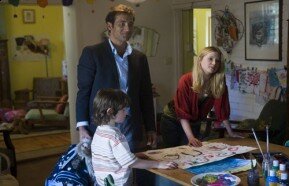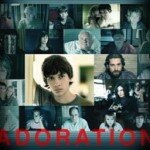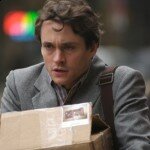After all these years, Scott Hicks still finds himself so drawn to little old Adelaide. It’s taken a long time for him to film there again after the huge unexpected success of Shine (1996); although the off-beat Hollywood path he’s followed has been successful, it seems that ultimately there’s no place like home. But for anyone who’s seen Hicks’ work, the poignancy is critical no matter the location. This Australian-English co-production gives that and more as an adaptation of the memoir by English sports journalist Simon Carr, and offers a story about grief that explores the struggles of a motherless family.
The Warrs are picture-perfect, with father Joe (Clive Owen) a successful sports journalist commuting in and out of Adelaide and mother Katy (Laura Fraser) taking care of their son Artie (young South Australian Nicholas McAnulty). But early on we discover that’s not how it is anymore; the first half of the film serves as an essential flashback where we discover how things used to be before Katy died. And it was a happier, cleaner place. The transformation during Katy’s slow decline resonates with Joe and Artie even after her death as they struggle to cope with what happened. Father-son bonding has never been so important – to either of them – but life is never so simple. There’s an important part of Joe’s past still holding on to him back in England and it’s this that creates the heaviest impact on their journey.
 |
The Boys Are Back slowly unfolds to reveal multiple levels of grief from Joe and Artie, which creates tense relationships and uncertain intentions. It’s saddening to see the heartbreak of the family and Joe’s initial effort to look after his son. He learns what it is to look after a child and provide support, and doesn’t get it right all the time; mistakes have dire consequences but at the same time life can be enormously sweet. Joe becomes a parent who sets limited boundaries, taking the theory that we’re here to have fun, and for him it seems to work. Unfortunately it’s those around him who are affected by his actions and Artie is right in the centre. As a young child, death is hard to comprehend and he goes through many different stages on his way to finding peace – with what happened and his dad. The idea of role models is explored further as Artie’s relationship with half-brother Harry (George MacKay) grows, and his entrance introduces complexity, confusion and a brotherly love that’s often temperamental.
What The Boys Are Back provides is a comprehensive look at how time usually hears all wounds. It doesn’t explain everything, nor should it, because that’s how life goes. But Simon Carr’s story reminds us that relationships come and go and that we have to deal with whatever’s served up to us. The amount of emotion in the first half of the film should surprise you; Hicks uses music to great effect throughout the film but that only serves as an aid to the overall product. The performance from Nicholas McAnulty is great for a young newcomer, while Clive Owen is solid and Erik Thomson makes a notable impact as workmate Digby Hill. It’s a bit of fun location-spotting for Adelaide audiences too; the new Advertiser building could easily fit into any Hollywood film.
Verdict:
The Boys Are Back is poignant in dealing with the stages of grief but lets up with a bit of fun. Scott Hicks really is back in town.
[Rating: 4/5]
 Follow the author Katina Vangopoulos on Twitter.
Follow the author Katina Vangopoulos on Twitter.



![Quiet Chaos [Caos Calmo] (Review) Quiet Chaos [Caos Calmo] (Review)](/wp-content/uploads/quiet-chaos-father-daughter1-150x150.jpg)

![My Friends, My Loves [Mes amis, mes amours] (Review) My Friends, My Loves [Mes amis, mes amours] (Review)](/wp-content/uploads/35hk3du1-150x150.jpg)










